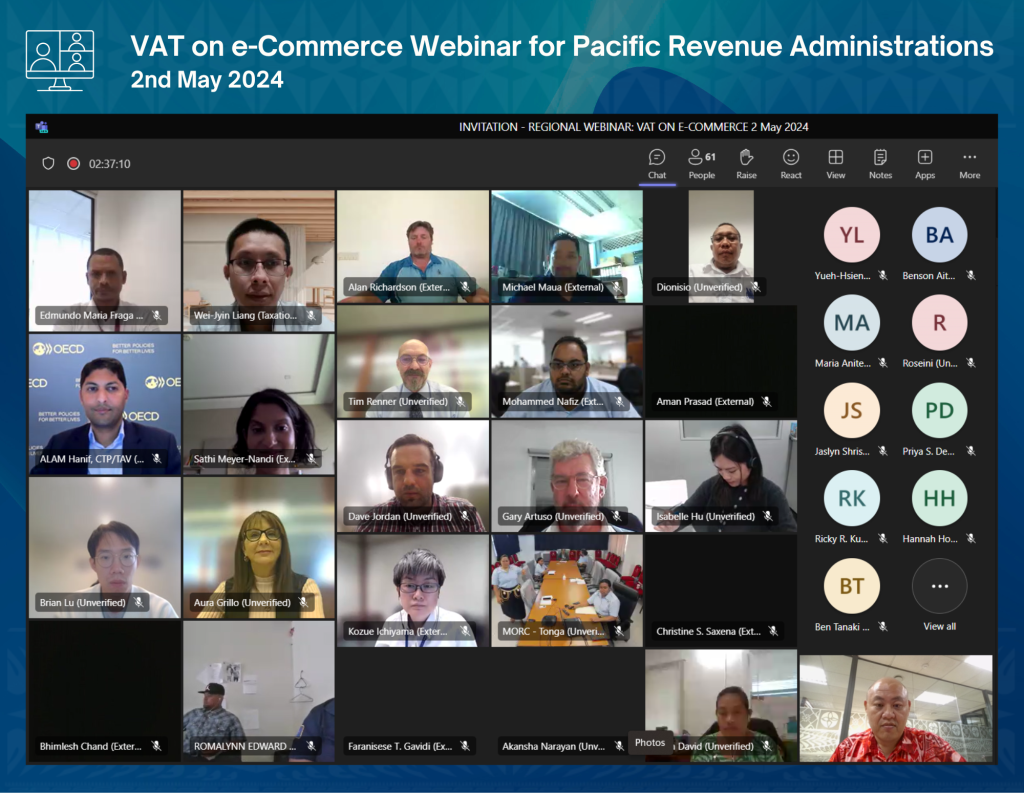
The Pacific Islands Tax Administrators Association (PITAA) recently hosted a webinar in collaboration with the Asian Development Bank (ADB), Australian Taxation Office (ATO), Organisation for Economic Cooperation and Development (OECD) and Inland Revenue Department of New Zealand (NZIRD) focused on the Value Added Tax (VAT) on E-commerce for Pacific Revenue Administrations.
The webinar, which took place on Thursday, 2nd May 2024, aimed to address the challenges faced by Pacific Revenue Administrations in taxing cross-border online sales.
Mr. George Mow, the Head of the Secretariat at PITAA, highlighted the global nature of e-commerce, and that it has become increasingly difficult for tax authorities to track and collect taxes on digital transactions. He also pointed out that many countries have implemented VAT or Goods and Services Tax (GST) on online sales to ensure that these transactions are properly taxed, leading to a significant increase in revenue collection.
Tax Integrity Specialist at ADB, Sathi Nandi said that in contrast to other areas of the international tax field where debates are still going on over the difficulties facing the digital economy, the VAT regulations on e-commerce are settled, with jurisdictions agreeing that the country of the consumer has the right to tax.
She further explained that applying standards for e-commerce suppliers and cross-border digital services will help increase important public revenue and level the playing field for both domestic and international companies and if executed logically, it would also help lower the cost of compliance.
Ms. Kozue Ichiyama from the Asian Development Bank (ADB) shared valuable insights on the historical perspective of VAT implementation in e-commerce. She highlighted the traditional approach of tax authorities, where the server of goods was required to have a physical presence in the country where sales were made, leading to VAT registration in that specific country. Ms. Ichiyama emphasized the importance of clarifying the place of supply, reporting responsibilities, and accounting practices to ensure transparency for both suppliers and customers.
“In this case, the place of supply, the reporting and accounting responsibility is clear, and with the place of the top line being where both the supplier and customer are located,” she added.
Mr. Alam Hanif from OECD outlined key elements for the successful implementation of international VAT guidelines and best practices. He stressed the significance of communication campaigns and consultations with the international business community before enforcement measures are rolled out. Mr. Hanif emphasized the need for high-quality guidance and support services for taxpayers to ensure compliance and understanding of the new VAT regulations.
The webinar also received country experience presentations from the ATO, NZIRD and Taxation Administration, Ministry of Finance, Taipei, China.
Overall, the webinar on VAT on E-commerce for Pacific Revenue Administrations provided valuable insights into the challenges and opportunities in taxing digital transactions in the Pacific region. By addressing these challenges and working together to implement effective tax policies, Pacific countries can increase revenue collection and ensure a level playing field for both traditional and online businesses.
PITAA continues to promote international standards and best tax administration practices, suitable to the characteristics of the Pacific Island countries.
